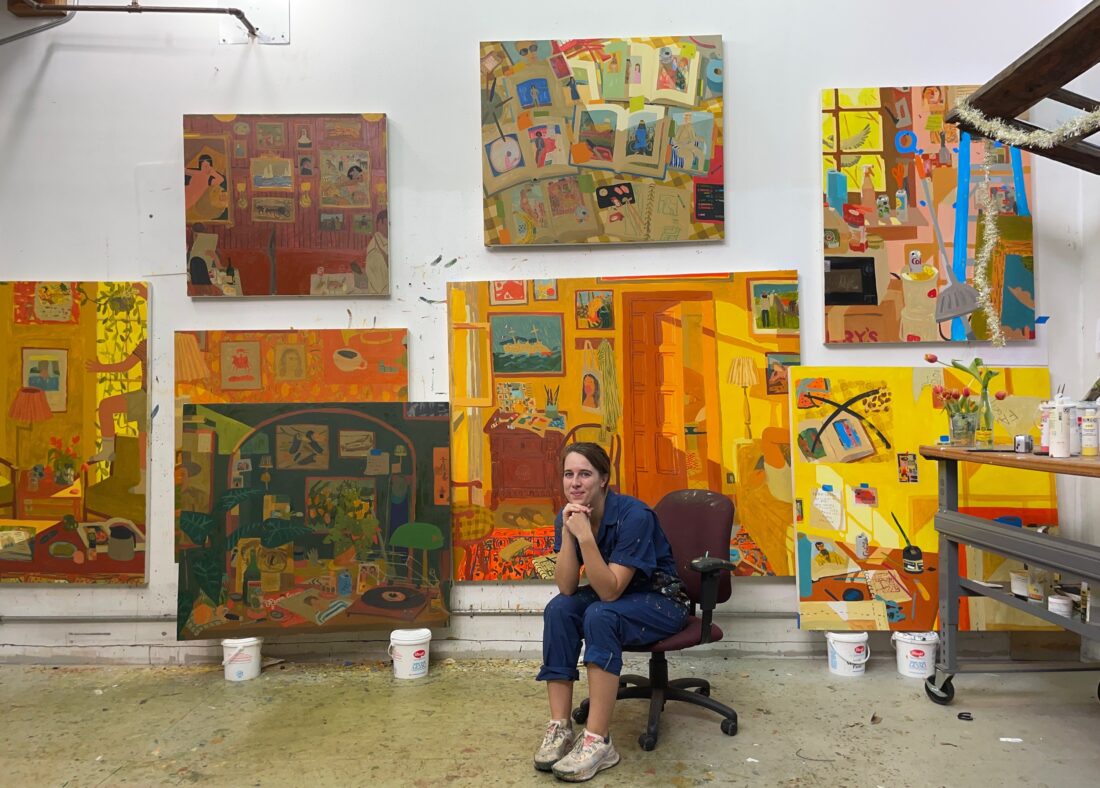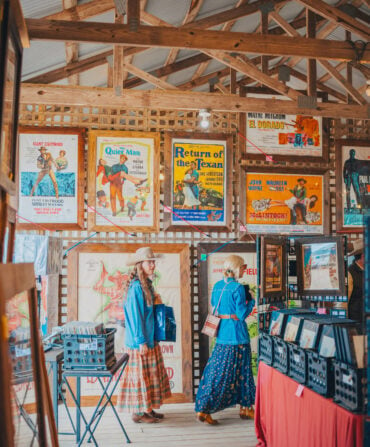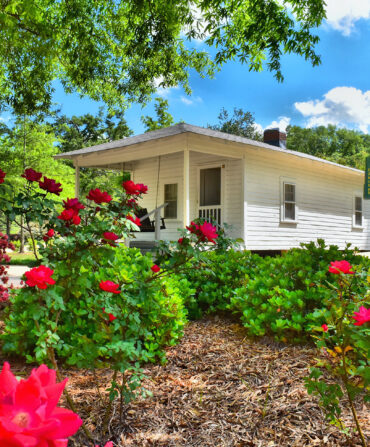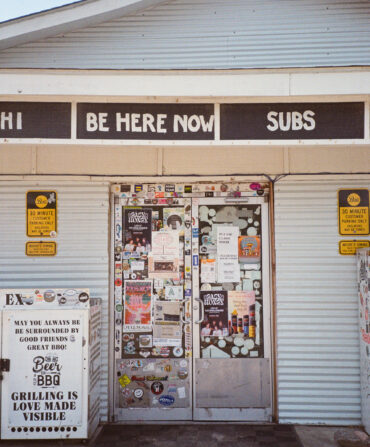In Sophie Treppendahl’s color-bathed paintings, the artist reconjures the intimate spaces of her bathroom, studio, bedrooms, and sprawling tablescapes. Her artworks—many of them for sale through Philip Martin Gallery in Los Angeles— are shrines to moments of everyday existence and the things we collect while making memories. The mess of life is honored as evidence of joy: stray crayons, chair backs dressed with striped shirts, plates of unfinished supper, kicked-off suede clogs under a dresser, and opened glass jars of jam.
As an artist focused on familiarity, place, and worldbuilding, Treppendahl remembers her hometown of St. Francisville, Louisiana, with exceptional fondness. “It was pretty wonderful to grow up in such a small town,” says Treppendahl, who often makes the two hour drive from New Orleans to St. Francisville to visit her parents. After the birth of Treppendahl’s son last fall, bringing the baby to her homeplace brought a renewed sense of pride in the close-knit community. “It’s really special to go into the local spots and introduce him to people who have known me since I was little.”
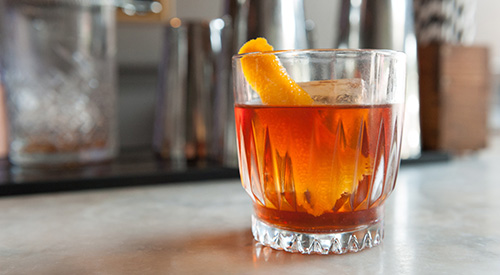
Treppendahl shares her perfect day in the West Feliciana Parish town:
Morning
One of Treppendahl’s first—and favorite—stops is Grace Church. “It has a beautiful vaulted ceiling,” Treppendahl says. “You walk in, and it’s breathtaking.” Built in 1860 and surrounded by sprawling live oaks and pink azaleas, Grace is one of the oldest Protestant churches in the state. After basking in the light of the stained glass under vaulted ceilings and catching up with old neighbors, Treppendahl loves to walk around the cemetery, which is one of the oldest in the area, likely owing to its higher elevation. The peaceful green space helps to calm down her baby whenever he’s feeling fussy, too.
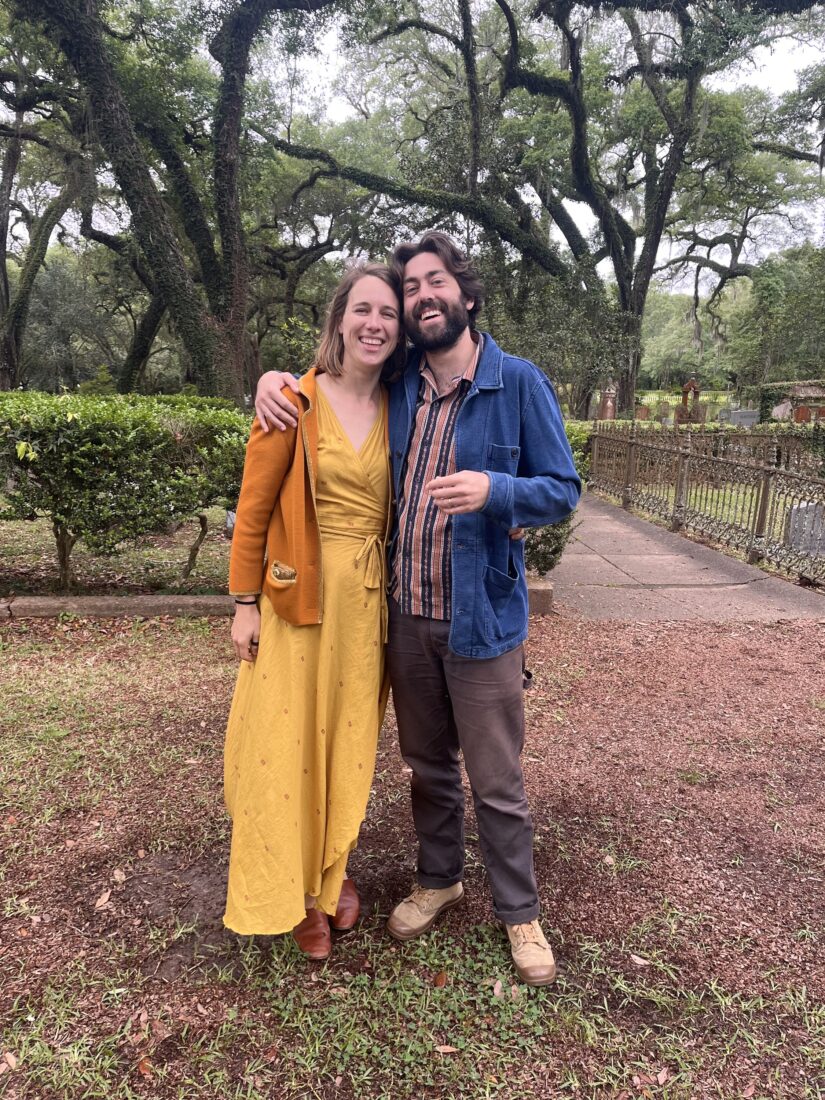
After morning service, Treppendahl and her family shuffle into the charming and cozy Birdman Coffee & Books for breakfast, sliding around a table with mismatched wood chairs. The name pays homage to John James Audubon, who came to St. Francisville as a drawing tutor in 1821 (visitors will find traces of his legacy around town, including at the Audubon State Historic Site at Oakley Plantation, where he stayed during his visit and created dozens of avian paintings). Birdman serves up Southern classics like old-fashioned yellow grits, strips of crispy bacon, and syrup-pooled waffles, but Treppendahl usually settles on a pastry or stack of pancakes. “I have to take a nap after I eat them,” she laughs.
Afternoon
Thirty minutes outside of town, waterfalls abound—an unusual sight in the Louisiana wilderness. Tunica Hills (also known as Clark Creek Natural Area) extends more than 700 acres alongside the Louisiana and Mississippi border, where winding paths snake through hills dotted with loblolly pine, Eastern red cedar, pawpaws, and wild blackberries, and more than fifty falls. The landscape is home to rare and imperiled species, including the endangered Webster’s salamander and plants like bay starvine, carpenter’s ground-cherry, climbing bittersweet, and woodland bluegrass.
Treppendahl and her friends loop back to the trails to tread the paths they walked in high school. “It’s really hilly and refreshing to swim in the waterfalls after a big rain,” she says. Near the entrance to the Clark Creek Nature Trail, time seemingly stands still at the Pond Store, a humble white country shop built in 1881. While the store no longer sells goodies, it’s still open for tours where visitors can appreciate the nostalgia and frozen-in-time jars of pickled veggies, rock candy, and bottles of soda that pad the shelves.
For lunch, Magnolia Cafe back in town is the usual go-to for Treppendahl and her family. The charming white and sage green cottage has been a self-proclaimed “town square” since swinging open its doors in 1982. “It has everything, but everyone in my family gets the Magnolia turkey special,” Treppendahl says. With slices of avocado, turkey, and a heap of bean sprouts, it’s “the most delicious little thing.”
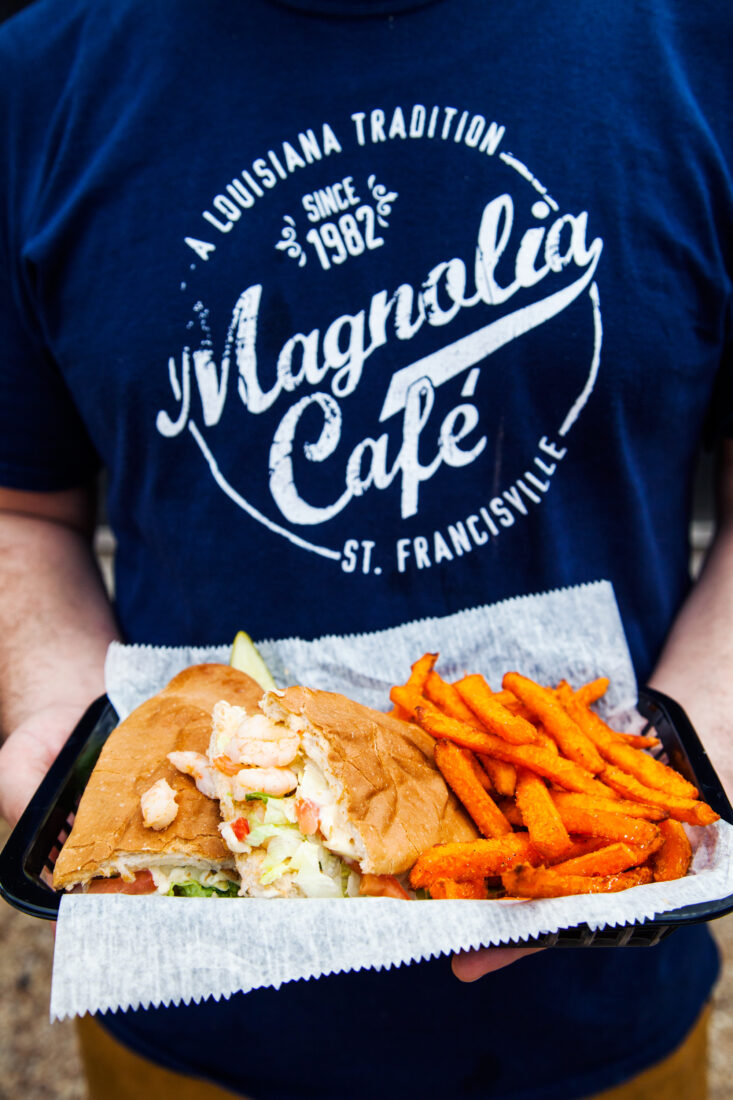
Evening
Depending on the tide, Treppendahl and her friends might head over to the Oyster Bar, a charming dive with cocktails and food trucks on the bank of St. Francisville’s Bayou Sara. The bar operates on the water’s schedule, deliberately allowing the river to flow through and closing for weeks when it’s submerged. “It’s a nonevent and happens multiple times a year,” Treppendahl says. “It’s part of the charm.” But when it’s dry, patrons kick back on the deck and listen to live bands by the river.
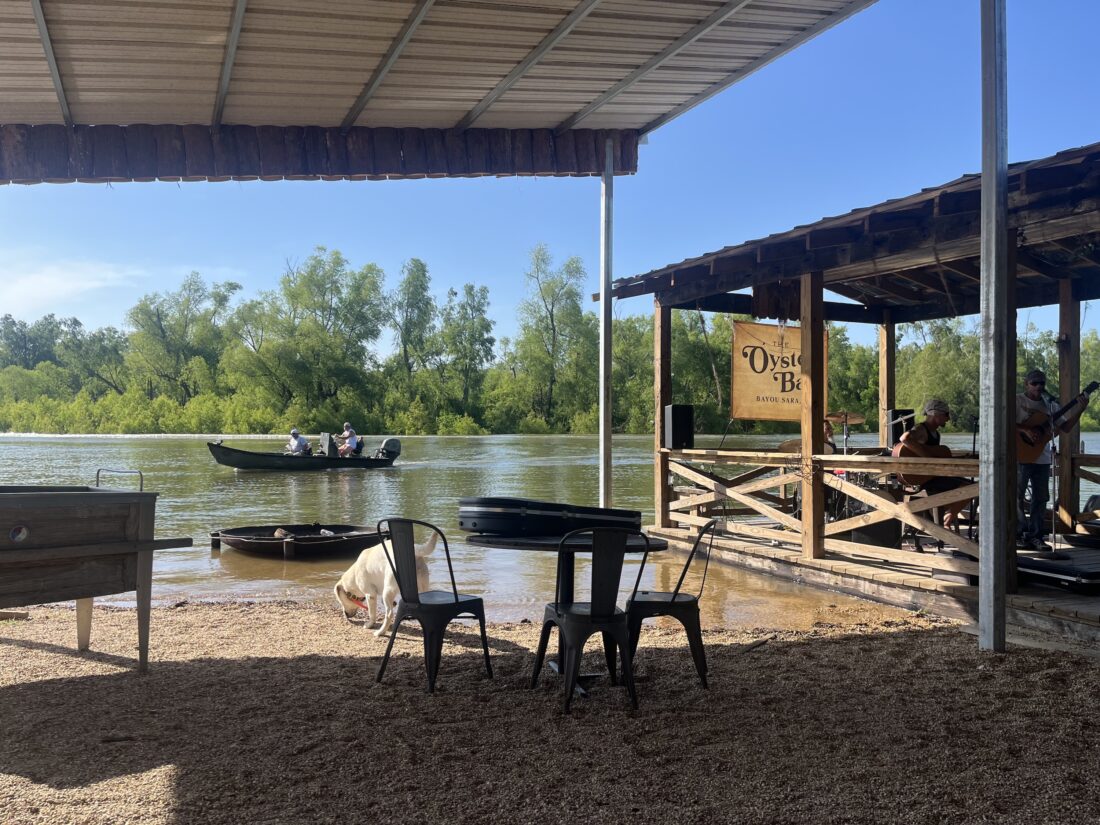
Whether the family is celebrating a birthday or Treppendahl just being back in town, an evening at St. Francisville Inn is always a welcome treat. “It’s so charming and ornately decorated,” Treppendahl says. “It’s where the locals are.” The sweet Queen Anne-inspired cottage was built in 1880 and swapped hands a few times; in the 1980s, it underwent extensive renovations by Richard Filet and his family after it fell into disrepair. The shady fern-lined porch is Treppendahl’s preferred perch for a classic negroni at the inn’s restaurant, the Saint. “It’s a fancy place to put on a nice outfit and have a special meal,” she says. The menu changes frequently, but the kitchen makes the most of the area’s bounty with pecan-crusted fish, saucy fig pork chops, and tomato relish–topped crabcakes.
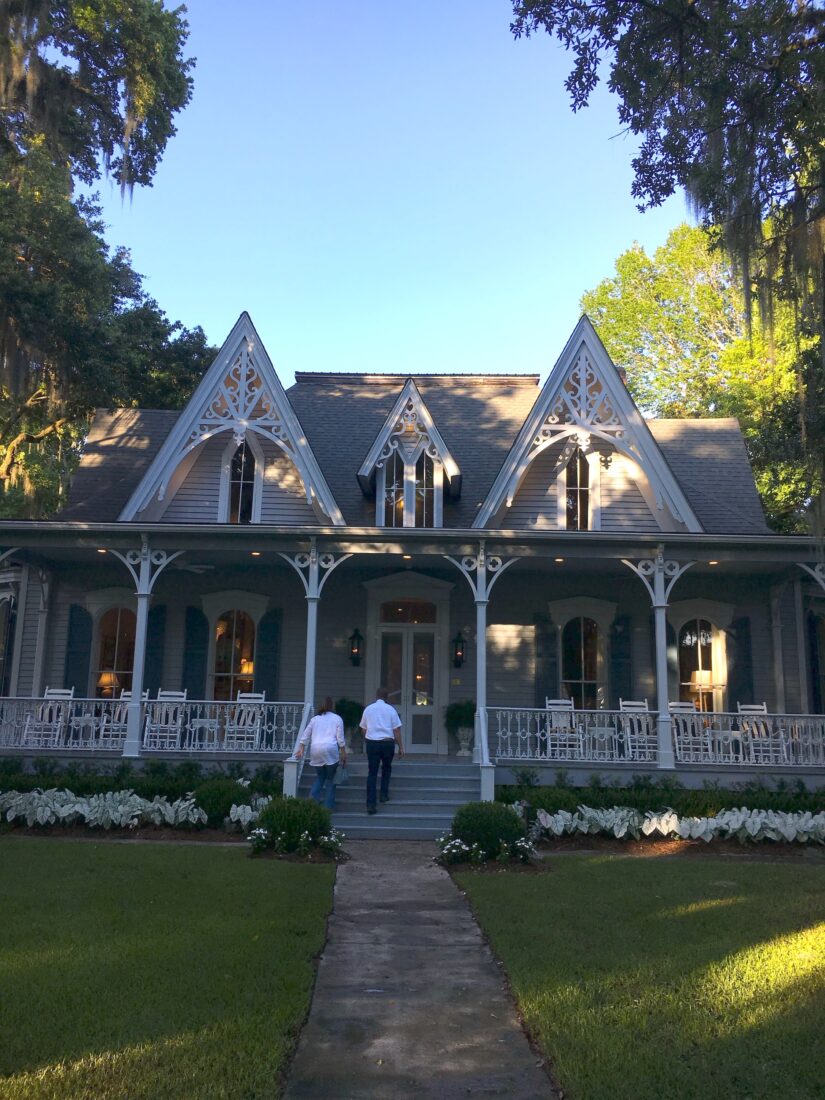
Gabriela Gomez-Misserian, Garden & Gun’s digital producer, joined the magazine in 2021 after studying English and studio art in Virginia’s Shenandoah Valley. She is an oil painter and gardener, often uniting her interests to write about creatives—whether artists, naturalists, designers, or curators—across the South. Gabriela paints and lives in downtown Charleston with her golden retriever rescue, Clementine.


